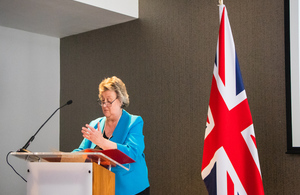50 top online government services to be easier and faster to use than ever before
Online government services will become easier than ever before for people to use thanks to upgrades and investment in the Civil Service workforce over the next 3 years.

- 50 of the most frequently used digital government services to be upgraded by 2025
- more than 6,500 senior civil servants will be upskilled through digital bootcamps, ensuring they have the skills to focus on the public’s priorities
- over £1 billion will be saved by updating old tech and streamlining processes
Key online government services will become easier than ever before for people to use thanks to upgrades and investment in the Civil Service workforce over the next three years.
The plans, launched today by Cabinet Office Minister Heather Wheeler, are part of the government’s new digital and data strategy. It will see more than £1 billion savings generated by 2025, by eliminating unnecessary costs of paper based services.
As part of this, an estimated £101 million will be saved every year through better procurement, reducing attrition rates of talented staff and less reliance on costly consultants.
The new strategy will deliver significant improvements in digital systems, with the aim of having public services as easy to access as booking a holiday and shopping online.
By 2025, at least 50 of the most frequently used government services will be significantly improved, including by making services easily accessible on mobile devices, a single login available across government services, and bringing in intelligent data sharing making it easier and faster to register to vote and claim legal aid.
The strategy also sets out plans to upskill Civil servants through specialist training workshops, including assessed courses on sourcing good quality data and understanding the technologies that underpin digital services, with a target to equip more than 6,500 senior civil servants with essential digital skills by 2025. Digital standards will be embedded in performance reviews to ensure the way users interact with government services is at the forefront of decision-making.
Minister Heather Wheeler, Parliamentary Under-Secretary in the Cabinet Office, said:
When people order their groceries, book a holiday or check their bank accounts, they expect and receive a seamless and easy experience. The same should be true of government services.
This new strategy will put us in lockstep with the private sector, transforming the delivery of key services that people rely on so that they are simpler and faster to use while also cutting costs.
The savings of more than £1 billion will also come from better service delivery and the replacement of outdated IT systems, with the adoption of a ‘build once, use many times’ policy helping to reduce duplication of spend across government. The Central Digital and Data Office will work across government to ensure taxpayers’ money is efficiently spent, wielding departments’ collective buying power.
Cyber defences will also be bolstered across government through cyber training and annual testing, aligning with the Government Cyber Security Strategy to protect vital public services and sensitive data from malicious attacks.
To monitor progress, specific department-level digital and data targets will be drawn up and overseen by a forum of permanent secretaries.
Paul Willmott, Chair of the Central Digital and Data Office in the Cabinet Office, said:
This strategy represents a new era of cross-governmental collaboration on digital transformation and puts the public’s experience at the heart of online services.
Investing in the Civil Service workforce through high-quality training will enable government to improve its decision-making, while driving up digital standards and adoption across the board.
Notes to editors
Read the roadmap for digital and data.
The strategy sets out a clear roadmap for delivery of government’s plans on digital and data over the next 3 years.
The strategy focuses on 6 key missions, which are priority areas for digital transformation. They are:
- Transformed Public Services that Achieve the Right Outcomes
- One Login for Government
- Better Data to Power Decision Making
- Efficient, Secure and Sustainable Technology
- Digital Skills at Scale
- A System that Unlocks Digital Transformation
Find out more information about the roadmap on the Transforming for a Digital Future campaign website